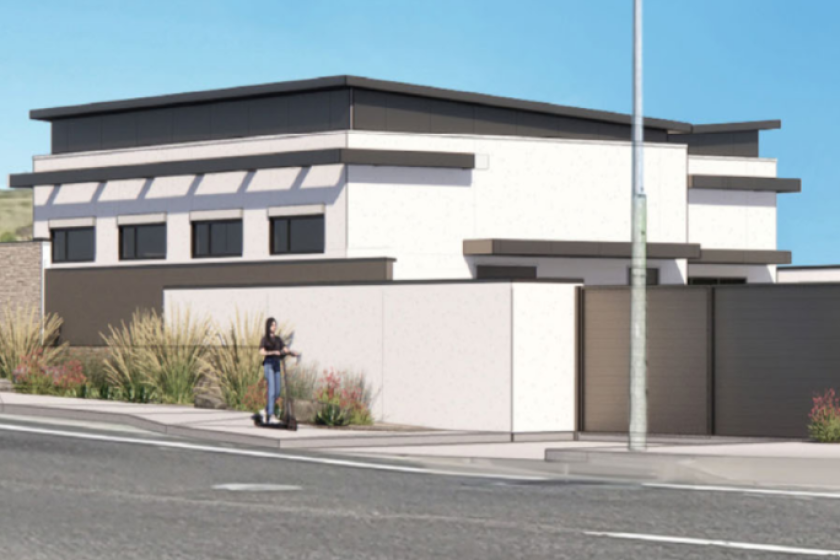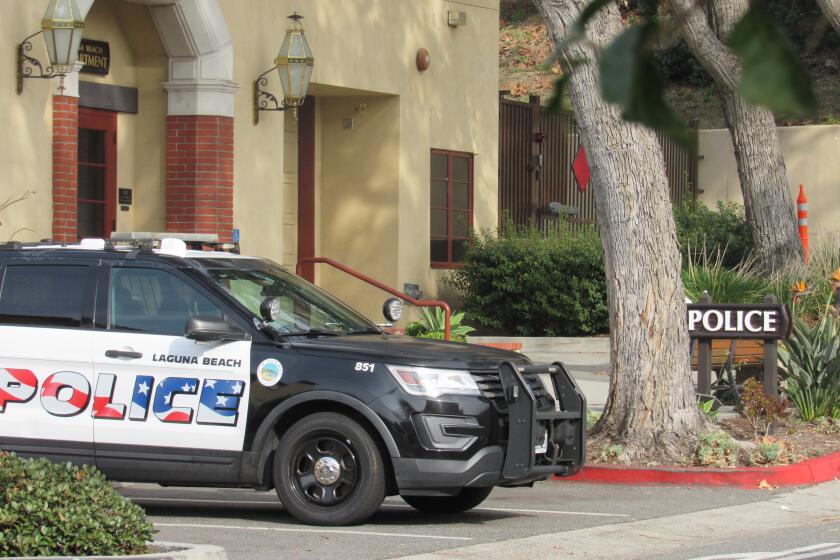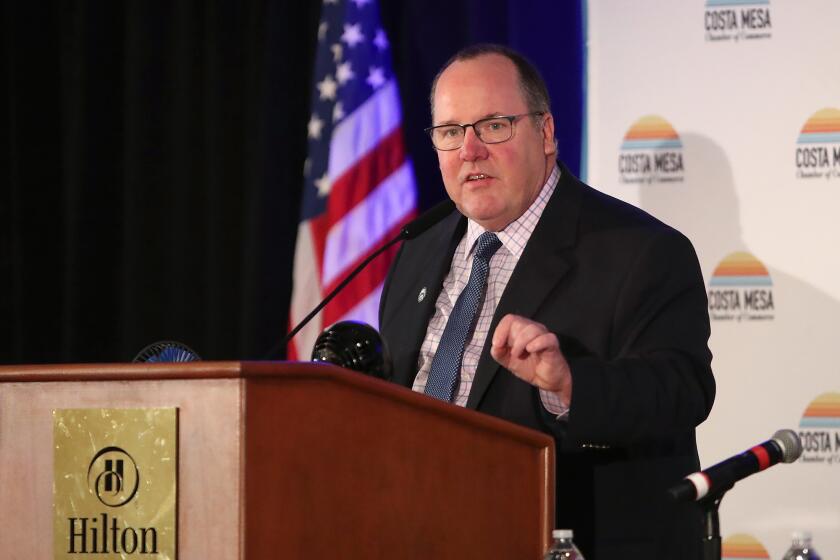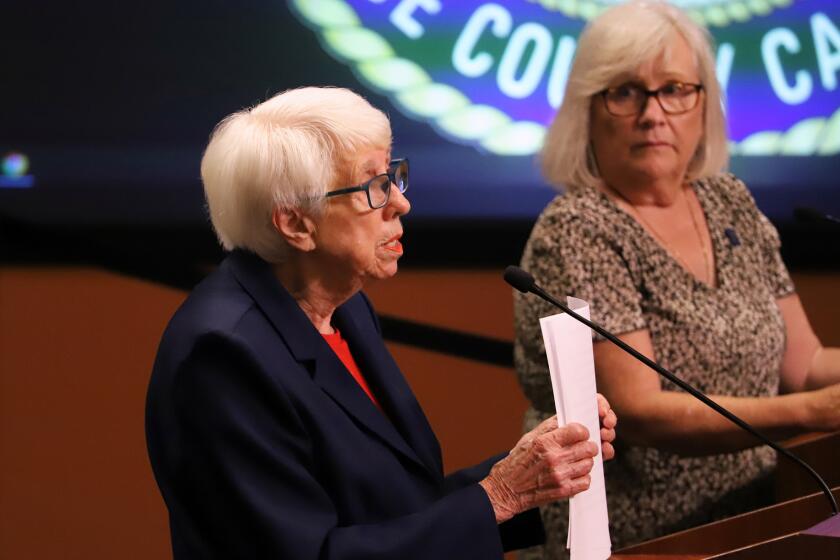A tough ride into Sunset
Stacy Londo can see the annexation of Sunset Beach through two sets of eyes.
One is that of a concerned resident who wants to preserve the pace of life in her tranquil seaside neighborhood.
The other is a child’s.
Londo, who has lived in Sunset for 13 years, shares some of her neighbors’ wariness about the area’s August annexation by Huntington Beach. Like them, she worries that the long-unincorporated strip of Orange County will lose its offbeat vibe, and that the city may implement parking meters and other changes.
When she takes her 3-year-old son to the community playground by the beach, though, Londo can’t deny that annexation has brought a few welcome changes. In this case, they’re material ones: After Huntington took over Sunset, its Public Works Department removed the corroded equipment and put in new swings, a slide and more.
“At the end of the day, we’re excited to get it upgraded,” Londo said on a recent Monday as her son raced around the sand.
It has now been eight months since an Orange County Superior Court judge officially placed Sunset under Huntington’s control. In the two years before the decision, some in Sunset bitterly fought the move and even attempted to turn the neighborhood into its own city. An appeal of the annexation is winding its way through court.
But even as some Sunset residents fight the new taxes they pay every month, many find themselves in a position similar to Londo’s — finding the changes to the neighborhood minimal and, in some cases, welcome.
The Sunset Beach Community Assn., which served as the area’s de facto governing body before the annexation, still holds regular meetings, often with Huntington officials in attendance. The city has a committee of its own to deal with Sunset issues.
Some of the area’s roughly 1,200 residents say the city maintains greenery better than the county and that Huntington police respond more quickly than the county sheriff’s deputies.
A walk through the neighborhood, though, still reveals “No on Sunset annexation” signs in windows and a “Help save Sunset Beach” banner on the side of a popular tavern. The bulletin board outside the post office features anti-annexation literature alongside notices from the city and women’s club.
“The whole community is absolutely divided,” said Janese Johnsen, a 10-year resident and among those who opposed the annexation.
*
A fistful of dollars
The main issue that has divided Sunset for the last year and a half appears not on the playground or the beach, but in a few digits on residents’ monthly utility bills.
After Huntington voted to annex the community in 2010, officials believed Sunset residents wouldn’t have to pay the same utility users tax as the rest of the city. In November 2010, though, they reexamined the law and declared that Sunset would be treated the same as the rest of Huntington.
The Citizen’s Assn. of Sunset Beach, a newly formed nonprofit, filed a lawsuit a month later, demanding that the city and county negate the annexation or hold it until Sunset residents could vote on the taxes. Judge Frederick P. Horn ruled against the lawsuit in August, making the annexation official.
The citizens association, backed by the Howard Jarvis Taxpayers Assn., appealed. Huntington and the Orange County Local Agency Formation Commission, or LAFCO, filed their response briefs in March. A court date has not yet been set.
Huntington’s utility user tax adds 5% to Sunset residents’ monthly bills for electricity, water, natural gas and cable service, plus 4.9% for telephone usage. The city also added a pension-related property tax override of $0.015 per $100 of assessed valuation, although city Finance Director Lori Ann Farrell said she did not believe Sunset residents have begun paying it yet.
Citizens association President Jack Markovitz admitted he doesn’t personally know anyone who’s had trouble making ends meet with the new taxes, but said they could pose problems for some.
“It depends on who you are, I guess,” he said. “If you’re on a fixed income with limited funds, a few hundred extra dollars is going to make a difference.”
Tom Burke, the chairman of the Sunset Beach LCP Advisory Board, which oversees local development issues, called the extra charges only fair.
“This is beachfront,” he said. “This is a pretty affluent community, and for us not to pay our fair share is ridiculous. This is paid by everybody in the city. It goes into their general fund.”
*
Split into factions
To some, Markovitz and his supporters are waging a valiant fight to uphold the neighborhood’s integrity. To others, they protest too much and underrate the good work the city has done.
It’s difficult to gauge which side speaks for Sunset’s majority. According to community association President Mike Van Voorhis, every registered voter who lives in the neighborhood is by default a member of his group, including those who favor the appeal. Markovitz said more than 200 people have paid dues to join his organization.
The politically active members on both sides, he noted, may add up to a minority.
“I think it’s like everything else in life,” Markovitz said. “It’s like politics. You have the left and right and then the people in the middle who keep quiet and are resigned to business as usual.”
One who takes a middle ground on recent events is Greg Griffin, the former president of the community association who led a drive to raise funds for incorporation in 2010. Griffin wishes the neighborhood had been able to become its own city, but when he steps out his door in the morning, it still feels like the same place.
The city, he said, maintains the greenbelt as well as the county did, and as a renter, he hasn’t felt the brunt of the tax increases.
“I don’t see much of a difference,” Griffin said.
From the outside, Sunset shows few changes since before the annexation. Street signage marks it off from the rest of Huntington. The post office, where residents pick up their mail, remains a popular social spot, and neighbors are busy making plans for their annual art festival.
City officials have sought to accommodate residents’ requests, signing a memorandum that allowed Sunset to keep its beach hours and maintain the green belt as open space. Huntington also agreed to prohibit some businesses, including marijuana dispensaries and rehabilitation centers, at residents’ request.
Marc Hammad, the owner of Surf Liquor, has seen a difference — a positive one — in public safety since Huntington police began patrolling the area. Before, the Orange County Sheriff’s Department assigned cars to Sunset, but Hammad, who acknowledged that he has friends on the county force, said the city responds more quickly.
On the afternoon of Jan. 22, a 19-year-old man entered his store, grabbed an 18-pack of beer and ran out the door, where a getaway car awaited him at the curb. Hammad wrote down the license plate number and called the police, only to have an officer show up at his door within five minutes.
“I thought she was coming to write a report, but she told me they caught the guys,” said Hammad, who estimated that he has called the police five times since the annexation and always gotten a prompt response.
*
‘Nobody likes change’
Like other Sunset business owners, Hammad has paid a price for Huntington’s services: Once the city took over, it required them to get new business licenses, the startup cost of which runs slightly over $110 for a typical establishment.
The business licenses aren’t the only bureaucratic adjustment Sunset has had to make. Last May, a fire destroyed three houses along the beach. Architect Michael Porter, who is working with one of the homeowners to rebuild, hoped to go through the county for a permit, as Sunset applicants had done in the past.
Before annexation, the neighborhood operated under its own local coastal plan, enforced by the county, which laid out rules regarding development. After the transition, though, the California Coastal Commission declared that it would have to handle coastal development permits until Sunset received a new coastal plan as part of Huntington, city Planning Manager Mary Beth Broeren said.
She added that Huntington officials have asked the commission to review Sunset’s new plan in June, but have not yet gotten confirmation. Once the plan passes, the city will be able to issue development permits for Sunset.
In the meantime, Porter said, he’s having to apply to the state commission, which is asking for an “extraordinary number of items that usually don’t get requested” in permit applications.
Burke agreed that the transition has slowed some things down, but he predicted smoother days ahead for Sunset once the particulars are worked out. For a few months, he said, community association meetings often devolved into shouting matches. Now, the opposing factions have at least lowered their voices, if not abandoned their causes.
“Nobody likes change,” Burke said. “But I think this change has been for the good. I think that the county getting out of the municipal business is wise. The county should be in county business and the city should be in city business, because they do it better.”
Twitter: @MichaelMillerHB
All the latest on Orange County from Orange County.
Get our free TimesOC newsletter.
You may occasionally receive promotional content from the Daily Pilot.



